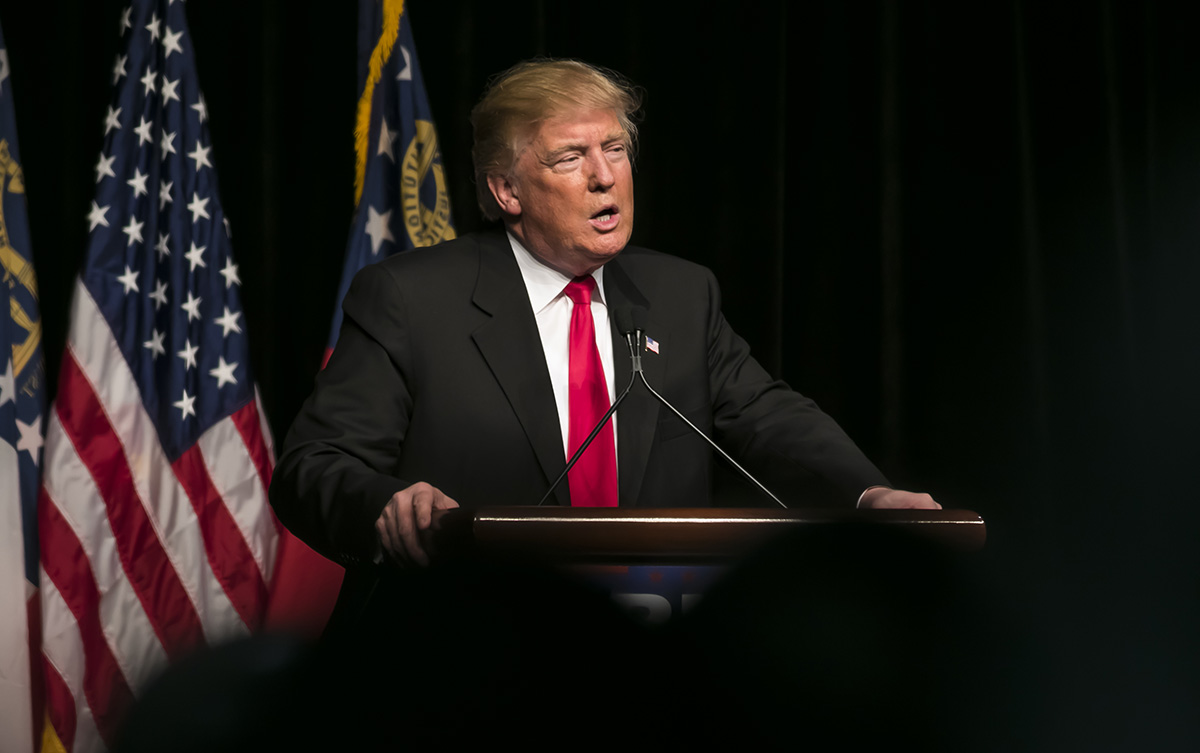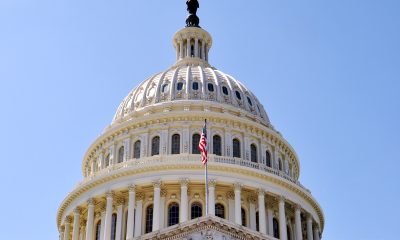National
Democrats in danger and playing defense
Pro-LGBT Senate allies Reid, Feingold, Boxer face tough re-election battles

U.S. Senate Majority Leader Harry Reid is one of several pro-LGBT lawmakers facing a tough battle for re-election this fall. (Photo courtesy of Reid's office)
Several veteran senators viewed as supportive of LGBT rights are facing tough re-election campaigns, prompting some activists and lobbyists to gear up for a defensive battle this fall.
Mike Mings, director of the Human Rights Campaign’s political action committee, said his organization is “certainly aware” that Democrats face a more difficult environment than in the previous two congressional elections.
“I think the Democrats were able to play offense in the last two cycles in a way that has created a different field today,” he said. “So, they’re [now] really looking at defense.”
Recently published polls brings into stark relief the troubling news for several incumbent U.S. senators. Rasmussen unveiled numbers last week showing Senate Majority Leader Harry Reid (D-Nev.) trailing potential Republican opponents by double digits.
According to the polls, Reid would lose in a match with former Nevada Republican Party Chair Sue Lowden, 54-39; in a contest between Reid and former State Assembly member Sharron Angle, he trails 51-40; and in a contest against attorney Danny Tarkanian, Reid comes up short again, 49-42.
Viewed as an LGBT ally on Capitol Hill, Reid was involved last year in the decision to attach the hate crimes bill to the defense authorization bill and has often spoken in favor of ending “Don’t Ask, Don’t Tell” in the U.S. military.
Also last year, Reid was the highest-ranking elected public official to endorse the National Equality March in D.C. A Mormon, Reid also reportedly criticized the Church of Jesus Christ of Latter-day Saints for backing Proposition 8, which ended same-sex marriage in California.
Another longtime senator who could face an uphill re-election fight is Sen. Russ Feingold (D-Wisc.). A Wisconsin Public Radio/St. Norbert College poll published last week found him behind Tommy Thompson, a former Wisconsin governor and former secretary of the U.S. Department of Health & Human Services who’s reportedly considering entering the Senate race.
In a hypothetical matchup, Feingold would lose to Thompson 45-33, according to the poll.
In 1996, Feingold was one of 14 senators to vote against the Defense of Marriage Act. Now a co-sponsor of the Employment Non-Discrimination Act and legislation to overturn “Don’t Ask, Don’t Tell,” Feingold introduced a resolution earlier this year to condemn legislation pending in Uganda that would institute the death penalty as punishment for those convicted of homosexual acts.
Also facing a tough re-election bid is Sen. Barbara Boxer (D-Calif.). A poll published late last month by the Public Policy Institute of California found her in a dead heat with three potential Republican opponents.
According to the poll, Boxer would be essentially tied with former congressman Tom Campbell, with him leading 44-43. She would also be in a dead heat with former Hewlett-Packard CEO Carly Fiorina, with Boxer leading 44-43. Late last month, The Hill newspaper’s election forecasters moved the race from “leans Democratic” to “toss-up.”
Boxer was also among the 14 senators to vote against DOMA in 1996. A co-sponsor of ENDA and of legislation to overturn “Don’t Ask, Don’t Tell,” Boxer last month introduced a bill that would allow same-sex domestic partners to have the same access to COBRA benefits as married couples in some circumstances.
Rose Kapolczynski, Boxer’s campaign manager, said the senator has “always expected a tough race” and has been “working for months to build a broad coalition of Californians from every background and walk of life.”
“With the active involvement of our supporters in the LGBT community and so many others, we will be able to reach out to the millions of Californians who will vote in November,” Kapolczynski said. “We need to do more to let California voters know that Barbara Boxer is focused on creating jobs and turning the economy around.”
The campaigns for Feingold and Reid didn’t respond to DC Agenda’s request for comment.
Mings said he couldn’t predict whether these senators would emerge victorious in their re-election campaigns. Still, he noted that they have an advantage because they’re incumbents, who traditionally fare better in elections.
“It’s not necessarily as big an advantage this year to be an incumbent as it is in other cycles, but it’s still [a] humongous advantage to be [an] incumbent, in terms of visibility, in terms of the organization and operations that they have, so I certainly wouldn’t count any of them out,” Mings said.
Hari Sevugan, press secretary for the Democratic National Committee, said in a statement that it’s important for LGBT people to support these Democrats in their re-election campaigns because the party “values equality, inclusion and fairness.”
“From expanding partnership benefits in the workplace to lifting the ban on travel for those living with HIV/AIDS, from passage of hate crimes legislation to beginning to end [‘Don’t Ask, Don’t Tell] — we have worked to advance gay-rights in all corners of our society,” he said. “It’s not where we want to be yet, but we are moving forward.”
Sevugan warned “the progress we made could be lost” and “we could once again move backward” if Democrats aren’t re-elected or lose their control of Congress.
“We’ve seen what’s happened in Virginia where a Republican governor has taken the Commonwealth backward in history,” he said. “That is why we are committed to working with the LGBT community to elect allies that will continue to move the country toward fulfilling its promise of equality and justice for all.”
Mings said HRC has already given the maximum allowed donations of $10,000 each to Reid and Boxer to help them with their re-election campaigns. For Feingold’s race, Mings said HRC is waiting to see if Thompson will enter the fray.
“If he does, obviously, that changes our calculation quite a bit,” Mings said. “We need to step in and make sure that we’re engaging our membership in Wisconsin as much as possible to help [Feingold].”
In addition to moving to protect senators, Mings said HRC donated the maximum of $5,000 last year to many vulnerable allies in the U.S. House who are part of the Democratic Congressional Campaign Committee’s Frontline Program.
“We don’t support all of those folks because some of them are pretty conservative Southerners or just conservative Blue Dogs, but we did make endorsements of a lot of those folks in late 2009 and made PAC contributions to them to try and help them with early money to boost their early financial filings,” Mings said.
Marty Rouse, HRC’s national field director, said his organization for now is focused on field work that seeks to persuade key senators to vote in favor of “Don’t Ask, Don’t Tell” and is “still trying, where we can, to mobilize in support of ENDA, expecting a vote in the House in next couple weeks.”
But around mid-to-late summer, Rouse said HRC will “pivot big time and shift all of our resources” to re-electing supporters in Congress, especially in the Senate.
“Clearly it’s going to take a few months to really flesh out, but our membership is already being messaged that our No. 1 priority this fall is going to be to re-elect our friends and mobilize our members as much as possible,” Rouse said.
Rouse said HRC will be as “strategic as possible” in determining the best way to support its allies, but it’s too early to say what exactly the plan will be. Rouse noted that polling data for these races is still early and many states still have primary elections.
“What is clear right now is that we’ll be spending the significant amount of our resources on defense and protecting our friends and making sure that they’re back there in 2011 and beyond,” he said.
Even with HRC’s field team working to re-elect these senators, Rouse said it’s important for LGBT people to look to themselves to ask what they’re doing to help in the election.
“One can discuss and look at the polls about where Harry Reid is, how’s he doing, and what’s going on, but the fact of the matter is we need to make sure that anyone we know that lives in Nevada is working as hard as they can to help re-elect Harry Reid,” Rouse said. “So we can ask those questions, but we really have to ask, ‘What are you doing to make sure that Harry Reid gets re-elected? What are you doing to help make sure Barbara Boxer gets re-elected?’”
Rouse said it’s important that LGBT people are visible and working to help the re-election of congressional supporters.
“Once we’re in full election mode, we need to be there on the campaign trail supporting our allies and working really hard to be visible in helping them be re-elected because they will remember that we are there,” he said.
But could incumbent lawmakers become victims of political apathy among LGBT people if legislative priorities like ENDA and repeal of “Don’t Ask, Don’t Tell” don’t move this year?
Michael Cole, an HRC spokesperson, said LGBT voters are “certainly” looking to this Congress for “action on pressing equality issues” and will be mindful of this progress as November approaches.
“That being said, there are a number of pro-LGBT champions up for reelection this year who have the record to deserve whole hearted support from the community,” he said.
But Jimmy LaSalvia, executive director for GOProud, a gay conservative group, said LGBT voters should carefully consider whether to support incumbent lawmakers this year.
“There [are] a lot of issues that gay people care about and there isn’t a single one of those Democrats, in my opinion, who have done anything that I would deem worthy of re-election,” LaSalvia said. “So ask yourself as a gay voter, ‘Well, what have they done that I agree with?’ And I’ll bet you that gay and lesbian [voters] can look at any of those senators and say, ‘You’re fired!’”
Should enough Democrats lose their seats this fall, control of either chamber of Congress could switch hands. Republicans would have to take 10 seats in the Senate and 41 seats in the House to regain control of both chambers of Congress. Such a loss of control would recall the 1994 election, when Republicans retook control of the House and Senate during Democratic President Bill Clinton’s first term in office.
LaSalvia said it’s too early to tell whether Democrats will lose control of Congress this fall, but noted that the situation would become clearer as the year progresses.
“I think it’s way too early to tell, but certainly they would lose seats, and all signs [show] gains by the Republicans,” he said. “I think that we’ve got a long summer ahead of us and the electoral picture and landscape will be a lot clearer when we get to September.”
Mings said he didn’t think Democrats would lose control of Congress because not enough seats are in jeopardy, but he noted that polling and fundraising numbers indicate the party will lose some seats.
“So the thing that’s important to remember is that a lot of people were caught off guard in 1994, and that’s something the Democrats are not going to let happen this time,” he said. “They’re really making sure that their folks are prepared for a really tough, brutal, expensive election and they’re out there really trying to show that their candidates are doing that.”
National
House Republicans propose steep cuts in federal AIDS budget
Advocacy groups say move would eliminate ‘Ending HIV Epidemic’ initiative

The Republican-controlled U.S. House Subcommittee on Labor, Health, and Human Services, Education, and Related Agencies approved a spending bill on June 26 that calls for cutting at least $419 million from federal AIDS programs that AIDS activists say would have a devastating impact on efforts to greatly reduce the number of new HIV infections by 2030.
The subcommittee’s proposed bill, which includes billions of dollars in cuts in a wide range of other federal health, education, and human services related programs, is scheduled to be considered by the full House Appropriations Committee on July 10. Officials with AIDS advocacy groups say they are hopeful that the full committee, like last year, will refuse to approve the proposed cuts in the AIDS budget.
The proposed GOP cuts would eliminate $214 million from the U.S. Centers for Disease Control and Prevention’s HIV prevention programs, $190 million from the Ryan White HIV/AIDS Program, and $15 million from the Department of Health and Human Services Secretary’s Minority HIV/AIDS Program.
Activists say the impact of those cuts would kill the federal government’s Ending the HIV Epidemic initiative, which among other things, calls for reducing the number of new HIV infections in the U.S. by 75 percent by 2025 and by 90 percent by 2030. The activists point out that ironically the Ending the HIV Epidemic initiative was launched during the administration of President Donald Trump.
“Instead of providing new investments in ending HIV by increasing funding for testing, prevention programs, such as PrEP, and life-saving care and treatment, House Republicans are again choosing to go through a worthless exercise of cutting programs that the American people depend on and will never pass,” said Carl Schmid, executive director of the HIV + Hepatitis Policy Institute.
“While we vigorously fight these cuts, we look forward to working with the entire Congress in a bipartisan fashion on spending bills that can actually become law,” Schmid said in a statement.
Schmid noted that the bill also includes provisions known as “policy riders” that would take away rights and protections from women, such as access to birth control and abortion, and for minorities, including LGBTQ people.
According to a statement released by the office of Rep. Rosa DeLauro (D-Conn.), who is the ranking minority member of the House Appropriations Committee, one of the policy riders would “block the Biden administration’s policies to ensure nondiscrimination on the basis of gender identity and sexual orientation.’ The statement says another policy rider would “prevent policies or programs intended to promote diversity, equality, or inclusion.”
Most political observers believe the Democratic-controlled U.S. Senate would also kill the GOP proposed policy riders and cuts in the AIDS budget if the full Republican-controlled House were to approve the budget bill passed by the appropriations subcommittee.
Rep, Tom Cole (R-Okla.), who serves as chair of the full House Appropriations Committee, released a statement on June 27 defending the subcommittee’s bill and its proposed spending cuts. “The bill provides appropriate and fiscally responsible funding to ensure these departments can continue to perform their core missions while also acknowledging the fiscal realities facing our nation,” he said.
“Importantly, the bill pushes back on the Biden administration’s out-of-touch progressive policy agenda, preventing this White House from finalizing or implementing controversial rules or executive orders,” Cole said in his statement. “It also preserves long standing bipartisan policy provisions protecting the right to life.”
U.S. Supreme Court
Concern over marriage equality in US grows two decades after first Mass. same-sex weddings
Gay and lesbian couples began to marry in Bay State in 2004

Two decades after Massachusetts became the first state to legalize same-sex marriage, a new study reveals both significant progress and ongoing challenges for married LGBTQ couples in the U.S., with a growing sense of insecurity about the future of their rights.
The Williams Institute at UCLA School of Law surveyed 484 married same-sex couples from all 50 states and D.C. The study, released Monday, marks the 20th anniversary of legal same-sex marriage in the U.S.
Researchers found that 93 percent of respondents cited love as a primary reason for marrying, with 75 percent also mentioning legal protections. Over 83 percent reported positive changes in their sense of security, and 74.6 percent noted improved life satisfaction since marrying.
However, the study also highlighted persistent discrimination and growing concerns about the future. About 11 percent of couples who had a wedding reported facing prejudice during the planning process.
Alarmingly, nearly 80 percent of respondents expressed concern about the potential overturning of the 2015 Obergefell v. Hodges decision, which legalized same-sex marriage nationwide. This anxiety has been exacerbated by initiatives like Project 2025, a conservative policy blueprint that some fear could roll back LGBTQ rights if implemented.
The possibility of a former President Donald Trump victory in the upcoming election has further intensified these concerns. Many respondents cited Trump’s previous U.S. Supreme Court appointments and his statements on LGBTQ issues as reasons for their apprehension. One participant stated, “The thought of another Trump presidency keeps me up at night. We’ve come so far, but it feels like our rights could be stripped away at any moment.”
The current political climate has 29 percent of respondents considering moving to another state, with 52.9 percent citing socio-political concerns as a primary reason. This reflects a growing sense of insecurity among LGBTQ couples about their rights and freedoms.
Brad Sears, founding executive director of the Williams Institute, noted, “The data clearly show that marriage equality has had a profound positive impact on same-sex couples and their families. However, it also reveals ongoing challenges and serious concerns about the future of these rights in light of current political trends and the upcoming election.”
Christy Mallory, legal director at the Williams Institute and lead author of the study, added, “This research provides crucial insights into the lived experiences of same-sex couples two decades after marriage equality began in the U.S. The high level of concern about potential loss of rights underscores the continued importance of legal protections and public support for LGBTQ+ equality.”
The study found that 30 percent of surveyed couples have children, with 58.1 percent of those parents reporting that marriage provided more stability for their families. However, many of these families now worry about the security of their legal status in the face of potential policy changes and shifting political landscapes.
As the nation reflects on two decades of marriage equality, the study underscores both the transformative power of legal recognition and the ongoing need for vigilance in protecting LGBTQ+ rights. The findings highlight the complex reality faced by same-sex couples in America today: Celebrating hard-won progress while grappling with uncertainty about the future, particularly in light of upcoming political events and potential shifts in leadership.
State Department
State Department hosts meeting on LGBTQ rights and foreign policy
Event took place before Pride Month reception

Secretary of State Antony Blinken on Thursday hosted a group of LGBTQ activists and politicians from around the world at the State Department.
The event — described as a “Convening on U.S. Foreign Policy: National Security, Inclusive Development, and the Human Rights of LGBTQI+ Persons” — took place before the State Department’s annual Pride Month reception. Participants included:
• Jessica Stern, the special U.S. envoy for the promotion of LGBTQ and intersex rights
• U.S. Ambassador to the U.N. Linda Thomas-Greenfield
• U.S. Trade Representative Katherine Tai
• U.S. Ambassador to India Eric Garcetti
• Suzanne Goldberg, senior advisor to the Under Secretary of State for Civil Security, Democracy, and Human Rights
• Under Secretary of State for Civilian Security, Democracy, and Human Rights Uzra Zeya
• U.S. Agency for International Development Senior LGBTQI+ Coordinator Jay Gilliam
• USAID Counselor Clinton D. White
• National Security Council Senior Director for Democracy and Human Rights Kelly Razzouk
• Assistant U.S. Secretary of Health Adm. Rachel Levine
• National Security Council Human Rights Director Jess Huber
• U.N. Assistant Secretary General for Human Rights Ilze Brandt Kehris
• Icelandic Ambassador to the U.S. Bergdís Ellertsdóttir
• Council for Global Equality Co-Executive Director Mark Bromley
• Outright International Senior Advisor for Global Intersex Rights Kimberly Zieselman
• Essy Adhiambo, executive director of the Institute for Equality and Non Discrimination in Kenya
• Pau González, co-chair of Hombres Trans Panamá and PFLAG-Panamá
“Forty-five years ago, thousands gathered in D.C. in what became the first national march for LGBTQI+, demanding their voices be heard,” said Thomas-Greenfield in a post to her X account that showed her speaking at the event. “We must continue to carry forward the spirit of these pioneers and fight for equal rights and dignity for all.”
Forty-five years ago, thousands gathered in DC in what became the first national march for LGBTQI+, demanding their voices be heard.
We must continue to carry forward the spirit of these pioneers and fight for equal rights and dignity for all. 🏳️🌈🏳️⚧️ pic.twitter.com/oph2Ahmfhq
— Ambassador Linda Thomas-Greenfield (@USAmbUN) June 28, 2024
President Joe Biden in 2021 signed a memo that committed the U.S. to promoting LGBTQ and intersex rights abroad as part of his administration’s overall foreign policy.
“LGBTQI+ rights are human rights,” said Blinken. “Our government has a responsibility to defend them, to promote them — here and everywhere.”
Blinken noted consensual same-sex sexual relations remain criminalized in 64 countries, with the death penalty in 11 of them.
He specifically highlighted Uganda’s Anti-Homosexuality Act and Hungarian Prime Minister Viktor Orbán’s government’s “smearing scapegoating, stigmatizing LGBTQI+ persons — vilifying them with degrading labels, denying them equal rights, normalizing violence against them.” (Gay U.S. Ambassador to Hungary David Pressman this month marched in the annual Budapest Pride parade.)
Blinken noted Iraqi MPs earlier this year “passed legislation that punishes same-sex relations with up to 15 years in prison.” He also pointed out that Indonesian lawmakers approved a new criminal code banning extramarital sex.
“In a nation where same-sex couples cannot marry, these laws effectively make all same-sex conduct illegal and they undermine privacy for all Indonesians,” said Blinken.
“We’re defending and promoting LGBTQI+ rights around the world,” he said.
Blinken noted seven countries — Barbados, St. Kitts and Nevis, Antigua and Barbuda, Dominica, Namibia, Singapore, the Cook Islands — have decriminalized consensual same-sex sexual relations over the last two years. He also highlighted Greece, Liechtenstein, and Thailand this year extended marriage rights to same-sex couples, and other countries are banning so-called “conversion therapy.”
“These achievements are possible because of incredibly courageous human rights defenders and government partners on the ground, but I believe America’s support is indispensable,” said Blinken. “When we engage — sometimes publicly, sometimes privately, sometimes both — when we share our own knowledge and experience, we can and we do achieve change.”
Blinken also announced the U.S. now considers sexual orientation and gender identity are part of the International Covenant on Civil and Political Rights that took effect in 1976.
“This is one of the key treaties committing nations to upholding universal rights,” he said.
“In our regular reporting to the council on human rights, we will continue to include incidents of discrimination or abuse committed against LGBTQI+ persons, now with the clear framework of this well-supported interpretation,” added Blinken. “That will further empower our efforts.”
Blinken reiterated this point and the Biden-Harris administration’s commitment to the promotion of LGBTQ and intersex rights abroad when he spoke at the State Department’s Pride Month event.
“Defending, promoting LGBTQI+ rights globally is the right thing to do, but beyond that, it’s the smart and necessary thing to do for our country, for our national security, for our well-being,” he said.
-

 Canada2 days ago
Canada2 days agoToronto Pride parade cancelled after pro-Palestinian protesters disrupt it
-

 Theater5 days ago
Theater5 days agoStephen Mark Lukas makes sublime turn in ‘Funny Girl’
-

 Baltimore4 days ago
Baltimore4 days agoDespite record crowds, Baltimore Pride’s LGBTQ critics say organizers dropped the ball
-

 Sports4 days ago
Sports4 days agoHaters troll official Olympics Instagram for celebrating gay athlete and boyfriend












